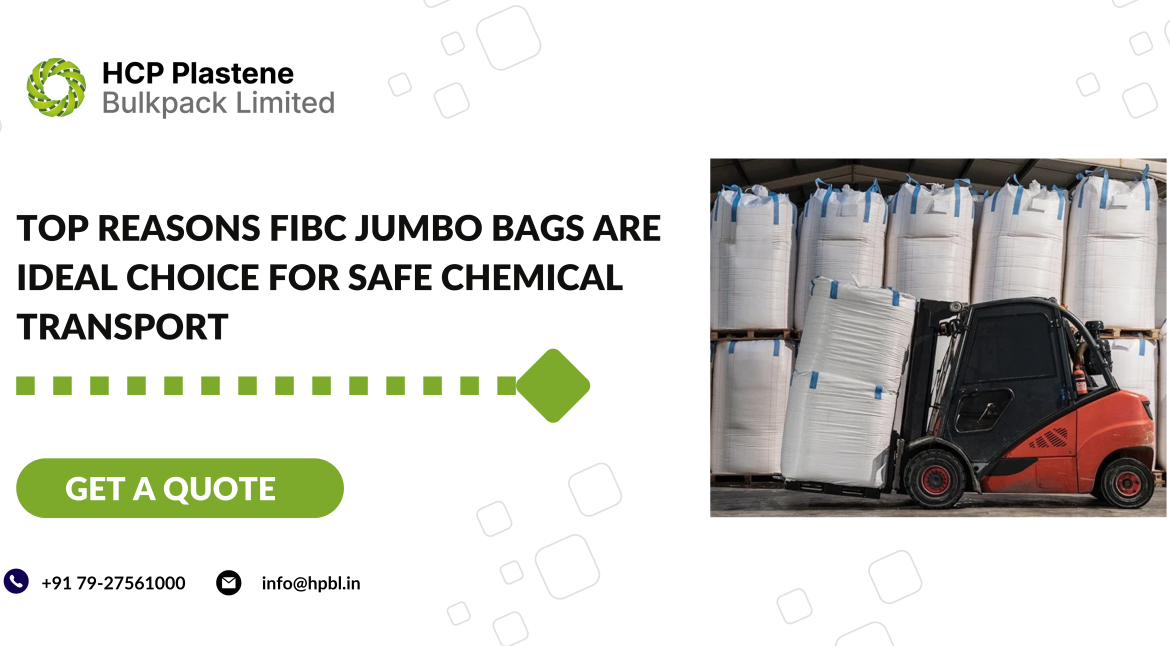In today’s fast-paced industrial world, the transport of chemicals, whether hazardous or non-hazardous, requires utmost care, precision, and reliability. One packaging solution that has stood out for its efficiency, safety, and versatility is the FIBC Jumbo Bag. Flexible Intermediate Bulk Containers (FIBCs), commonly known as jumbo bags or bulk bags, have become an industry standard for transporting various substances, including chemicals. These bags are designed by jumbo bags manufacturers in India to handle heavy loads, offer excellent protection during transit, and meet the stringent safety requirements associated with chemical handling.
Below, we explore the top reasons why FIBC Jumbo Bags are the ideal choice for safe chemical transport.
-
Superior Strength and Durability
FIBC jumbo bags are manufactured using woven polypropylene, a highly durable thermoplastic polymer. This material is resistant to tearing, puncturing, and chemical reactions. When chemicals are being transported, it’s crucial that the packaging remains intact to prevent leaks, spills, or contamination. The robust construction of FIBC bags ensures that they can safely carry weights ranging from 500 kg to over 2,000 kg without compromising structural integrity.
-
Customizable Safety Features
One of the standout features of FIBC jumbo bags is their high degree of customizability. Depending on the type of chemical being transported, manufacturers can add features such as:
Inner liners:
For moisture-sensitive or highly reactive chemicals, liners provide an added barrier of protection.
Anti-static or conductive properties:
For transporting flammable chemicals, Type C or Type D FIBC bags are used. These are designed to prevent the build-up of static electricity and reduce the risk of explosions.
UV protection:
If the chemicals are sensitive to sunlight or need to be stored outdoors temporarily, UV-stabilized FIBC bags are an excellent choice.
-
Compliance with Safety Standards
FIBC bags used for chemical transport are manufactured in compliance with international safety standards such as ISO 21898 and UN guidelines for the transport of dangerous goods. Manufacturers often undergo certification processes to ensure that their bags meet global benchmarks for load capacity, static protection, and chemical resistance. For businesses operating across borders, using certified FIBC bags simplifies regulatory compliance and ensures smoother logistics processes.
-
Cost-Efficient and Lightweight
Transporting chemicals in traditional metal drums or rigid containers can be expensive and logistically challenging due to their weight and bulk. FIBC jumbo bags offer a more economical solution. They are lightweight, easy to handle, and reduce transportation costs significantly.
Moreover, because FIBC bags can be folded flat when not in use, they save on storage and return freight costs. Their reusability (if used for non-hazardous materials under safe guidelines) also adds to long-term savings.
-
Efficient Handling and Loading
Designed with integrated lifting loops, FIBC jumbo bags are easy to handle using forklifts or cranes, making the loading and unloading process much faster and safer. This is particularly important in industrial settings where time efficiency and worker safety are crucial. The availability of different discharge options also simplifies the emptying of chemicals at the destination point, minimizing handling risks.
-
Minimized Environmental Impact
Modern FIBC bags are often made from recyclable materials, and many types are designed for multiple uses. This reduces the overall environmental impact compared to single-use rigid containers or plastic drums. Additionally, since they are lightweight, they contribute to reduced fuel consumption during transportation. Some manufacturers even offer closed-loop recycling programs, allowing used bags to be collected, cleaned, and recycled safely which is a great option for environmentally conscious companies.
-
Protection Against Contamination
Cross-contamination is a serious concern when transporting chemicals. FIBC jumbo bags are often manufactured in cleanroom facilities to minimize the risk of contamination. Bags intended for chemical use may come with dust-proof seams, sealed valves, and food-grade inner liners for sensitive or high-purity chemical compounds.
The use of single-trip FIBC bags for certain hazardous chemicals also ensures that there is no risk of residue from previous contents affecting the new load.
-
Space Optimization
The square or rectangular shape of FIBC bags allows for better stacking and space optimization in shipping containers and storage warehouses. This helps in maximizing load capacity during shipping, reducing the number of trips needed, and thereby lowering overall logistical costs. Additionally, their collapsible nature when empty makes return shipments easier and more cost-effective.
Conclusion
The safe transport of chemicals is a critical concern for manufacturers, logistics providers, and environmental regulators alike. FIBC jumbo bags have proven to be an indispensable solution thanks to their strength, customizability, compliance with safety standards, and cost-effectiveness. Incorporating FIBC jumbo bags into your chemical transport strategy not only enhances safety and efficiency but also demonstrates a commitment to sustainability and responsible industrial practices. It’s no wonder that they have become the preferred choice for chemical transport across the globe.










